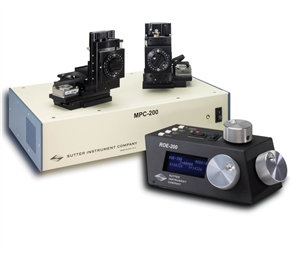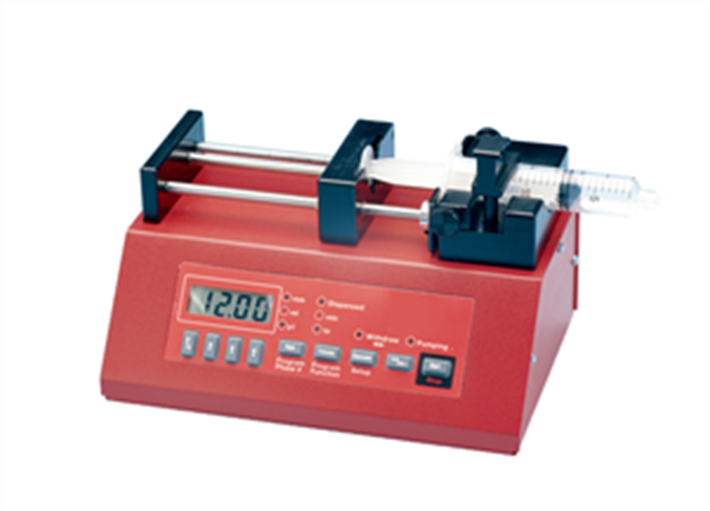

MPC-385
One MP-285 manipulator mechanical, one MPC-200 controller, one ROE-200, mounting adapter plate, rod holder, hinged headstage mount, 4" dovetail extension, manipulator and ROE connecting cables, power cord and manual
- Overview
- Specifications
- Accessories
- Citations
- Related Products
Overview

There are 1 images available to view - click to enlarge and scroll through the product gallery.
MPC-200 Series DataSheet
/ Download as PDF
MPC-385 Instruction Manual
/ Download as PDF
Manipulator Comparison Chart
/ Download as PDF
Neurobiological experiments are becoming more complex. Many require multiple manipulators with control units that quickly become space and/or cost prohibitive. The MPC-200 is the solution you have been asking for. A single controller capable of running 2 manipulators! Sutter Instrument has taken the simplicity of the MP-225 controller and expanded it to run two manipulators from a single controller/ROE. The MPC-200 works with one or two of our world-renowned mechanicals, the MP-285 (MPC-385), the MP-225 (MPC-325) or the narrow format MP-265 (MPC-365).
If two manipulators aren't enough, a second controller can be daisy chained to allow the single ROE-200 to move up to four manipulators. Thus the system can be easily expanded to control highly sophisticated experiments.
The Sutter MPC-200 is electrically quiet. Unlike the competition, our multi-unit controller employs linear output circuitry. Sutter adds additional manipulators to the same controller without requiring potentially noisy chopper drives.
Faster automated pipette exchange. The MPC-200 has faster “Home” and “Work Position” moves for quicker pipette exchange. Automation is set up and run via the same interface used in the MP-225 controller; however, the speeds of the automated movement are much faster.
Accelerated manual mode. For users who prefer manual pipette exchange we have added “Accelerated Mode” to the ROE. Using Accelerated Mode, the user can make quick manual moves in and out of a setup. Accelerated Mode amplifies the speed attainable in a manual move by smoothly accelerating to the maximum speed during sustained, fast turns of the ROE. Accelerated movement ends as soon as the user stops turning the knob. This mode can be fully disabled for those who feel the need for direct control of the pipette.
To provide the ultimate in flexibility, the MPC-200 can be purchased separately or as basic systems such as the MPC-385, MPC-365 and MPC-325. Additional component pieces can be added at any time, allowing the user to develop a system tailored to his or her particular needs. The controller is self-detecting so there is no need for manual configuration of the components.
FEATURES
- Single controller and ROE will run two stepper motor drive manipulators
- Self-detecting, daisy-chain capability allows control of four manipulators from one ROE-200
- User-friendly interface: single button access to all major functions
- New Accelerated Mode for fast, manual manipulator movement
- Easy toggle selection of Mode (speed/resolution, pulsed diagonal, Accelerated Mode)
- Display indicates X, Y, Z coordinates, Mode, active manipulator
- Robotic Home and Work Position moves for easy automated pipette exchange
- Faster robotic moves than previous versions
- Definable 4th axis for coaxial pipette movement, angle selected by DIP switches
- Simple USB interface
- Toggle switch selects which manipulator is connected to input device
- LED and display indicate active manipulator
- Low-drift mechanical stability
Specifications
TECHNICAL SPECIFICATIONS
Resolution and Full Travel Minimal microstep size is 62.5 nanometers per microstep Display has single micron resolution Full travel is 25mm in each axis
Maximum Speed MP-225 mechanical 3mm/sec MP-285 mechanical 5mm/sec
DRIFT Drive Mechanism < 1 micron/hr
Dimensions Controller 16in x11in x 3.5in | 41cm x 28cm x 9cm ROE 10in x 6in x 4in | 25cm x 15cm x 23cm
Weight Controller 6.5 lbs | 3 kg ROE 3.5 lbs | 1.6 kg
Electrical 115/230 Volts 50/60 Hertz power line
RoHS Compliant
Accessories
Citations
Targeting Kv1.3 channels to reduce white matter pathology after traumatic brain injury. (2016). Experimental Neurology, 283, 188–203. http://doi.org/10.1016/J.EXPNEUROL.2016.06.011
Yang, R., Fang, Y., Yang, J., & Lai, K. W. C. (2017). Design and Analysis of Electrical Resistance Feedback for Automated Patch Clamp on Adherent Cells. IEEE Transactions on Automation Science and Engineering, 14(2), 844–854. http://doi.org/10.1109/TASE.2016.2627580
Physiological recordings from the zebrafish lateral line. (2016), 133, 253–279. http://doi.org/10.1016/BS.MCB.2016.02.004
Kirichok, Y. (2013). Sperm Patch-Clamp. Cilia. Retrieved from http://books.google.co.uk/books?hl=en&lr=&id=4K3sHnZH2KAC&oi=fnd&pg=PA59&dq=mpc-385+sutter&ots=_FFjJeqgcA&sig=vypXTnJsPbfHCUezLDAQrdGvQ0U
Luo, Y., Shen, Y., & Li, J. (2013). Department of Electrical and Biomedical Engineering, University of Nevada, Reno, 89557 USA. … IEEE-NANO), 2013 13th IEEE Conference …. Retrieved from http://ieeexplore.ieee.org/xpls/abs_all.jsp?arnumber=6721020
Yang, R., Lai, K., Xi, N., & Yang, J. (2013). Development of automated patch clamp system for electrophysiology. Robotics and Biomimetics ( …. Retrieved from http://ieeexplore.ieee.org/xpls/abs_all.jsp?arnumber=6739793
Turcotte, R., & Alt, C. (2014). Characterization of multiphoton microscopy in the bone marrow following intravital laser osteotomy. Biomedical Optics …. Retrieved from http://www.opticsinfobase.org/abstract.cfm?uri=boe-5-10-3578
Lishko, P., & Clapham, D. (2013). Sperm patch-clamp. Methods in …. Retrieved from http://www.ncbi.nlm.nih.gov/pmc/articles/PMC3909741/
Menz, M., & Oralkan, Ö. (2013). Precise neural stimulation in the retina using focused ultrasound. The Journal of …. Retrieved from http://www.jneurosci.org/content/33/10/4550.short
Griener, A., Dyck, J., & Gosgnach, S. (2013). Regional distribution of putative rhythm-generating and pattern-forming components of the mammalian locomotor CPG. Neuroscience. Retrieved from http://www.sciencedirect.com/science/article/pii/S0306452213006714
Luo, Y., Shen, Y., & Mohan, N. (2013). Durable and cost-effective 3-D microforce sensor for musical tuning enhanced micro palpation of biological entities. Sensors, 2013 IEEE. Retrieved from http://ieeexplore.ieee.org/xpls/abs_all.jsp?arnumber=6688360
Yang, R., Lai, K., Xi, N., & Yang, J. (2013). Analysis of electrode condition for whole cell recording. Nano/Molecular Medicine and …. Retrieved from http://ieeexplore.ieee.org/xpls/abs_all.jsp?arnumber=6766313




Request
Catalogue
Chat
Print